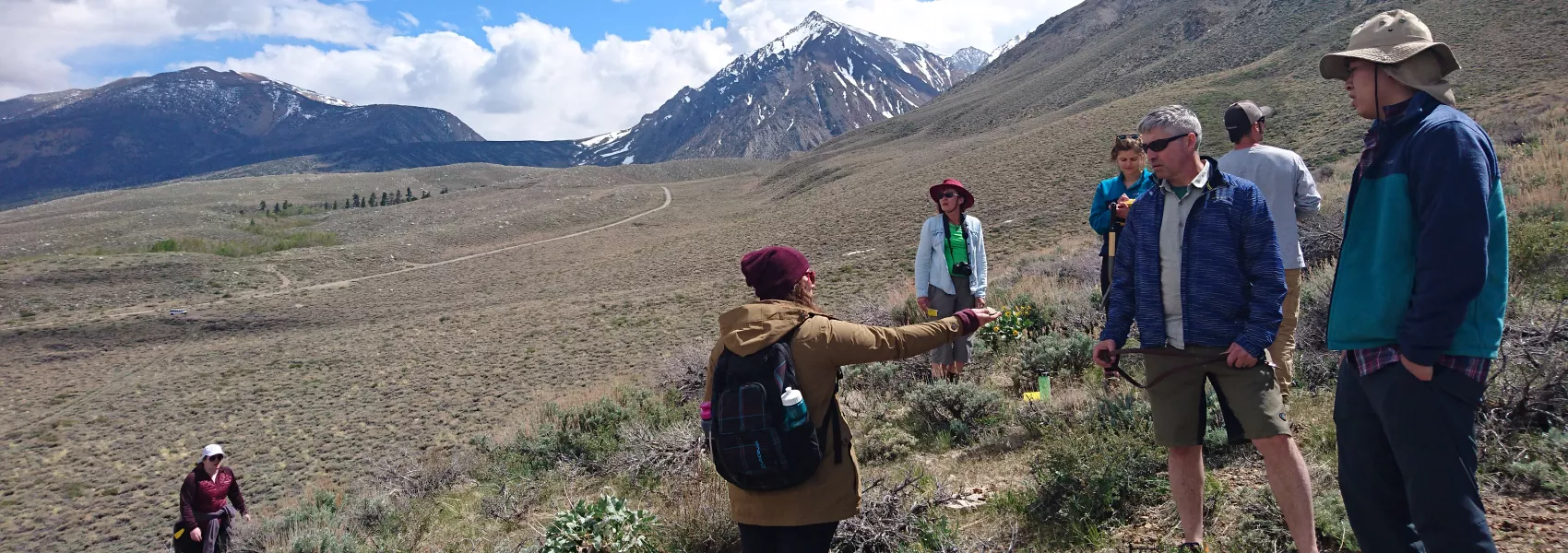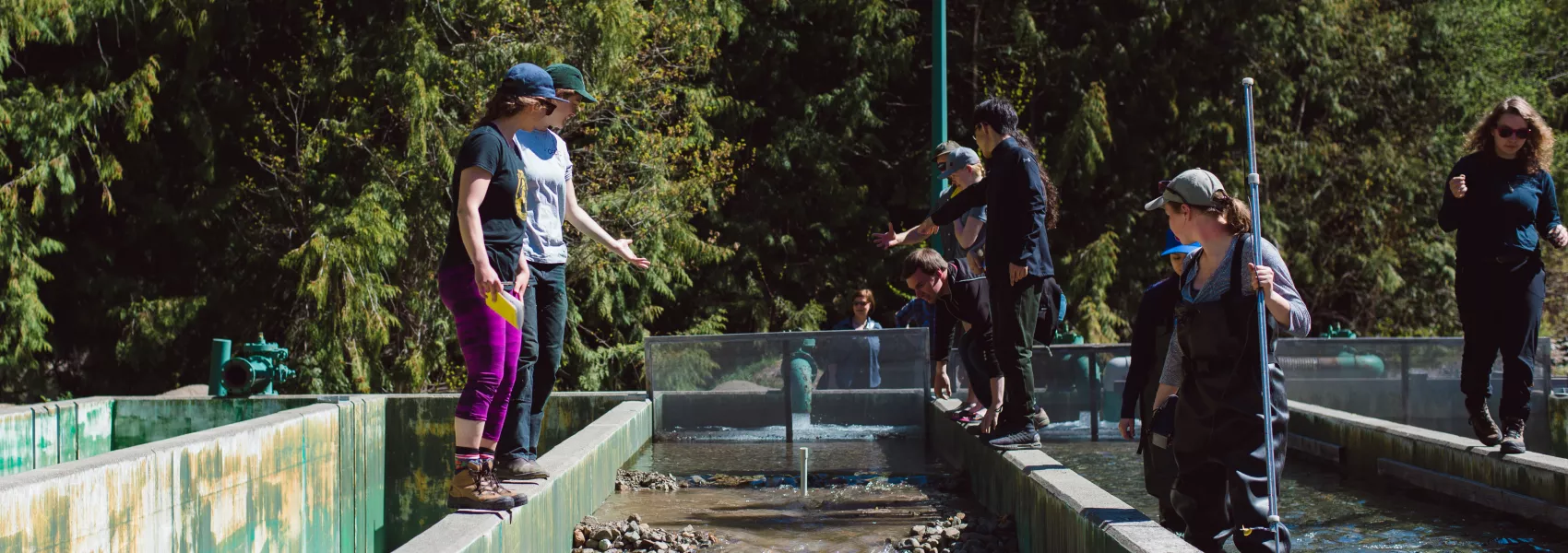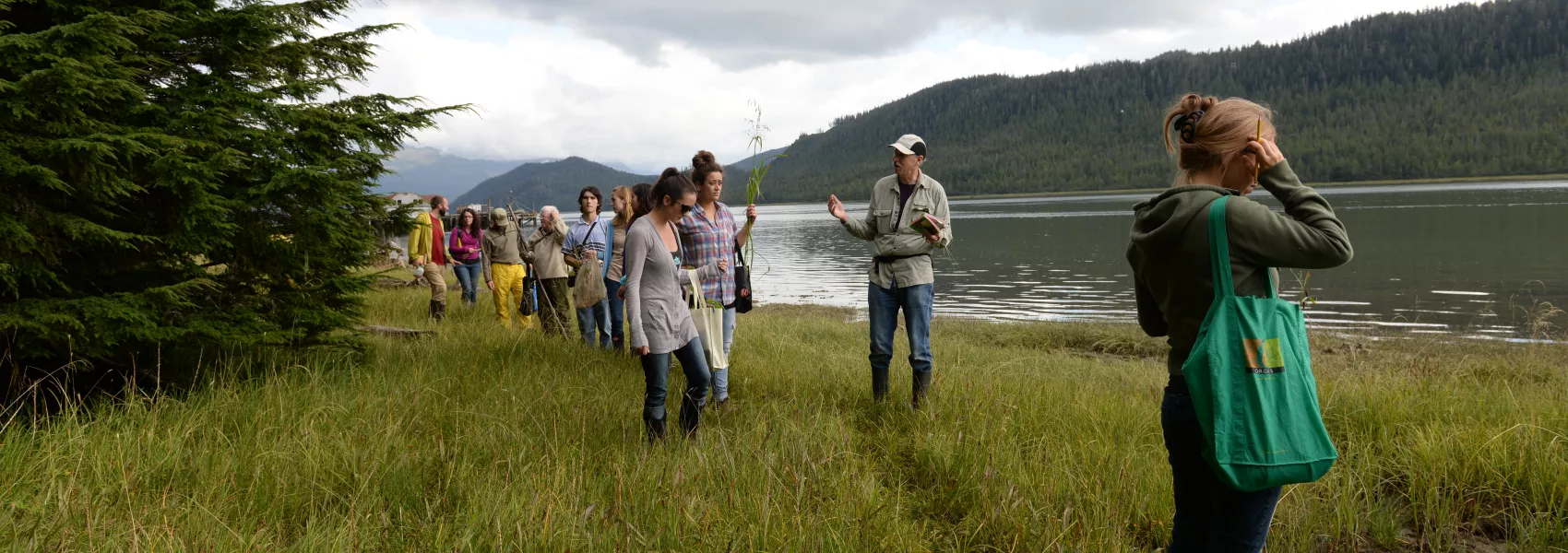
Geography, BSc
Physical geographers study patterns and processes on the Earth’s surface, and how human activities affect natural systems.
The Bachelor of Science (BSc) in Geography degree provides a broad background on the fundamentals of physical geography (climate, snow and ice, water, soils, ecosystems). It provides you with specialized expertise in geospatial analysis, geographic information systems (GIS), remote sensing, statistics, and field measurement methods that are critical skills for professional geoscientists and environmental consultants.
120 credits, 4 Years,
Part-time available
Program Details
This program builds your understanding of the interactions between Earth’s atmosphere, lithosphere (crust and upper mantle), hydrosphere (total amount of water) and the biosphere. You’ll discover how the planet's oceans, rivers, lakes, mountains, glaciers, forests, ecosystems, and weather and climate are interconnected.
The Geography (BSc) degree program focuses on geography as an earth science. Foundational courses in your first two years include biology, physics, chemistry, math, and coding.
In the third and fourth years, you’ll take courses on weather and climate, snow and ice, mountains, hydrology, geomorphology, soils and weathering, and geomatics. Electives in anthropology, environmental science, and natural resources management provide breadth and flexibility for students to follow their interests.
Field schools in southern California and British Columbia provide you with hands-on experience and the opportunity to apply your knowledge and skills in a wide variety of outstanding natural environments.
Career Paths
- Meteorologist
- Government researcher
- Environmental consultant
- Geoscientist
- Hydrologist
- GIS analyst
- Field technician
- Planning
- Climatologist
Why at UNBC
- Our nationally and internationally renowned faculty are experts in glaciers, hydrology, climate, remote sensing, mapping, and geographic information systems
- Develop highly valued field, technical, analytical, and writing skills
- Gain practical knowledge sought by a wide variety of employers
- Learn in a wide variety of settings, including lecture and seminar rooms, computer labs, wet and dry labs, and the Quesnel River Research Centre in Likely, B.C.
- Field trips to local, regional, and international destinations
'En Cha Huná
UNBC’s motto, from the Dakelh (Carrier) Elders, reminds us that all people have a voice and a viewpoint. Interpreted as “respecting all forms of life,” 'En Cha Huná encapsulates the spirit of academic freedom, respect for others, and willingness to recognize different perspectives.
Subscribe for updates
Receive personalized emails about your programs of interest, scholarships, application dates and more!
Admission Requirements
High School Requirements (applicable for B.C. and Yukon)
Overall average of 65% minimum in the following:
- English Studies 12 or English First Peoples 12
- Pre-Calculus 12 (minimum 60%)
- Approved Academic Grade 12 Course
- Approved Academic Grade 12 Course
- Additional Grade 12 Course (Elective or Academic)
Other requirements: Life Sciences 11 or Anatomy & Physiology 12**; Physics 11
**Anatomy & Physiology 12 can be counted as one of the Approved Academic Grade 12 courses.
Domestic Admission Requirements
View the full list of Approved Academic Grade 12 Courses
More high school admission requirements (including out-of-province, International Baccalaureate and Advanced Placement)
Transfer Requirements
- Have attempted at least 15 credit hours of post-secondary transferrable coursework from a recognized institution
- Be in good academic standing at the transfer institution
- Have a 2.0 GPA from the most recent 30 credits prior to transfer
- For the purposes of verifying any outstanding first-year prerequisites, high school transcripts may be requested
International Admission Requirements
International Student Requirements
- Meet UNBC's English language requirements
- Meet the international admission requirements by country or meet the admission with a General Certificate of Education (or equivalent)
- Complete the required high school course equivalencies outlined in the Domestic tab prior.
Transfer Requirements
- Have attempted at least 15 credit hours of post-secondary transferrable coursework from a recognized institution
- Be in good academic standing at the transfer institution
- Have a 2.0 GPA from the most recent 30 credits prior to transfer
- For the purposes of verifying any outstanding first-year prerequisites, high school transcripts may be requested
Tuition and Fees
(30 credit hours, 10 courses)
| Domestic | International | |
|---|---|---|
| Tuition* | $5,870 | $24,770 |
| Student Fees* | $1,185 | $1,185 |
| Books* | $1,700 | $1,700 |
* Tuition, fees and books are subject to change and vary among programs.
Scholarships, Bursaries and Awards
View the hundreds of available scholarships, bursaries, and awards.
- 1 in 4 students receive a UNBC financial award.
- $3,500,000 in financial awards given each year.

Landscape Conservation and Management
Address the contemporary challenges that face the sustainable use and conservation of our environment to ensure healthy ecosystems for future generations.
Our Landscape Conservation and Management degree focuses on integrated landscapes that support a wide variety of values and activities including the maintenance of biodiversity, the rights of Indigenous populations, ecosystem services and resource extraction.
120 credits, 4 Years,
Part-time available
Program Details
Our Landscape Conservation and Management degree provides you with the philosophical foundation, scientific theory, and technical skills to address the challenge of maintaining the functioning of ecosystems across developed, developing and still wild landscapes.
Take courses that consider human activities across a range of ecological scales where landscape and ecosystem-level processes are emphasized.
You will gain skills to work with cutting-edge tools and data that are necessary for the planning and management of multiple values across space and time.
Career Paths
- Wildlife conservationist
- Sustainability director
Why at UNBC
- Develop the necessary skills to identify, plan, monitor, and manage conservation values within the parks, recreation and tourism sectors
- Gain a deeper knowledge in informing policy, conducting citizen science, restoration, systematic conservation planning, multi-criteria decision analysis and risk assessment
- Integrate economic and social benefits through the goal of sustainable development of resources
'En Cha Huná
UNBC’s motto, from the Dakelh (Carrier) Elders, reminds us that all people have a voice and a viewpoint. Interpreted as “respecting all forms of life,” 'En Cha Huná encapsulates the spirit of academic freedom, respect for others, and willingness to recognize different perspectives.
Subscribe for updates
Receive personalized emails about your programs of interest, scholarships, application dates and more!
Admission Requirements
High School Admission Requirements (B.C. and Yukon)
*average of 65% minimum in the following:
- English Studies 12 or English First Peoples 12
- Pre-Calculus 12 (minimum 60%)
- Academic Course #2
- Academic Course #3
- Additional Grade 12 Course (Elective or Academic)
- *Other requirements: Life Sciences 11 or Anatomy & Physiology 12
Domestic Admission Requirements
View the full list of Approved Academic Grade 12 Courses
More high school admission requirements (including out-of-province, International Baccalaureate and Advanced Placement)
Transfer Requirements
- Have attempted at least 15 credit hours of post-secondary transferrable coursework from a recognized institution
- Be in good academic standing at the transfer institution
- Have a 2.0 GPA from the most recent 30 credits prior to transfer
- For the purposes of verifying any outstanding first-year prerequisites, high school transcripts may be requested
Tuition and Fees
(30 credit hours, 10 courses)
| Domestic | International | |
|---|---|---|
| Tuition* | $5,870 | $24,770 |
| Student Fees* | $1,185 | $1,185 |
| Books* | $1,700 | $1,700 |
* Tuition, fees and books are subject to change and vary among programs.
Scholarships, Bursaries and Awards
View the hundreds of available scholarships, bursaries, and awards.
- 1 in 4 students receive a UNBC financial award.
- $3,500,000 in financial awards given each year.

Northern Studies
Study the distinct socio-economic, cultural, political and physical environments of the circumpolar north. You will learn why this region is globally significant in terms of resource extraction, sustainability, Indigenous rights, climate change, and international cooperation.
Our four-year Northern Studies degree is one of only three offered in Canada. It is offered as a major and minor.
Our graduates can pursue a career in northern development, government, non-governmental organizations, social services, resource management, conservation and more.
120 credits, 4 Years,
Part-time available
Program Details
Northern Studies is an interdisciplinary field of particular importance to northern British Columbia and of growing relevance globally.
This program draws on northern-themed courses from geography, political science, anthropology and First Nations studies, as well as online courses in circumpolar studies offered through the University of the Arctic.
Develop your knowledge of how societies in the circumpolar north are adapting to climate and environmental change, globalization, population shifts, technology, and land-use demands.
Career Paths
- Local government administrator
- Economic development officer
- Journalist/News correspondent
- Researcher and policy analyst for federal/regional government or NGO
Why at UNBC
- Gain practical international experience with a semester study in the circumpolar north or participate in exchange programs in Scandinavia or the United States
- Work with faculty recognized internationally for their circumpolar expertise in the classroom and in the field
'En Cha Huná
UNBC’s motto, from the Dakelh (Carrier) Elders, reminds us that all people have a voice and a viewpoint. Interpreted as “respecting all forms of life,” 'En Cha Huná encapsulates the spirit of academic freedom, respect for others, and willingness to recognize different perspectives.
Subscribe for updates
Receive personalized emails about your programs of interest, scholarships, application dates and more!
Admission Requirements
High School Requirements (applicable for B.C. and Yukon)
Overall average of 65% minimum in the following:
- English Studies 12 or English First Peoples 12
- Approved Academic Grade 12 Course
- Approved Academic Grade 12 Course
- Approved Academic Grade 12 Course
- Additional Grade 12 Course (Elective or Academic)
Domestic Admission Requirements
View the full list of Approved Academic Grade 12 Courses
More high school admission requirements (including out-of-province, International Baccalaureate and Advanced Placement)
Transfer Requirements
- Have attempted at least 15 credit hours of post-secondary transferrable coursework from a recognized institution
- Be in good academic standing at the transfer institution
- Have a 2.0 GPA from the most recent 30 credits prior to transfer
- For the purposes of verifying any outstanding first-year prerequisites, high school transcripts may be requested
International Admission Requirements
International Student Requirements
- Meet UNBC's English language requirements
- Meet the international admission requirements by country or meet the admission with a General Certificate of Education (or equivalent)
- Complete the required high school course equivalencies outlined in the Domestic tab prior.
Transfer Requirements
- Have attempted at least 15 credit hours of post-secondary transferrable coursework from a recognized institution
- Be in good academic standing at the transfer institution
- Have a 2.0 GPA from the most recent 30 credits prior to transfer
- For the purposes of verifying any outstanding first-year prerequisites, high school transcripts may be requested
Tuition and Fees
(30 credit hours, 10 courses)
| Domestic | International | |
|---|---|---|
| Tuition* | $5,870 | $24,770 |
| Student Fees* | $1,185 | $1,185 |
| Books* | $1,700 | $1,700 |
* Tuition, fees and books are subject to change and vary among programs.
Scholarships, Bursaries and Awards
View the hundreds of available scholarships, bursaries, and awards.
- 1 in 4 students receive a UNBC financial award.
- $3,500,000 in financial awards given each year.

Wildland Conservation and Recreation
Conserving healthy environments while developing and managing sustainable uses of them is crucially important now and for future generations. This program teaches you about the challenges and approaches used to identify, advocate, and manage for healthy ecosystems.
Our Wildland Conservation and Recreation degree focuses on portions of the landscape where conservation values along with recreation and aesthetics are priority land uses and activities, and where these intersect with other values, priorities, and uses.
120 credits, 4 Years,
Part-time available
Program Details
Topics you will study in Wildland Conservation and Recreation include:
- the promotion of and advocacy for conservation
- integrated management of legally designated parks and protected areas
- conservation area design
-
human activities across these areas
Our degree provides students with the philosophical foundation, scientific theory, and technical skills to address the challenge of maintaining functioning ecosystems across developed, developing and still wild landscapes.
Experiential learning is integrated into class work, uses case studies, practical projects, applied field techniques and includes field schools, faculty-supervised research, and undergraduate research.
Career Paths
- Park warden and park planning
- Conservation area design
- Wildlife conservationist
- Sustainability director
- Work with ENGOs
- Land use manager
- Environmental educator
- Natural history and heritage interpreter
Why at UNBC
- Develop the necessary skills to identify, plan, monitor, and manage conservation values within the parks, recreation and tourism sectors
- Gain a deeper knowledge in informing policy, conducting citizen science, restoration, systematic conservation planning, multi-criteria decision analysis and risk assessment
- Integrate economic and social benefits through the goal of sustainable development of resources
'En Cha Huná
UNBC’s motto, from the Dakelh (Carrier) Elders, reminds us that all people have a voice and a viewpoint. Interpreted as “respecting all forms of life,” 'En Cha Huná encapsulates the spirit of academic freedom, respect for others, and willingness to recognize different perspectives.
Subscribe for updates
Receive personalized emails about your programs of interest, scholarships, application dates and more!
Admission Requirements
High School Admission Requirements (Applicable for B.C. and Yukon)
- average of 65% minimum in the following:
- English Studies 12 or English First Peoples 12
- Pre-calculus 12 (minimum 50%)
- Academic Course #2
- Academic Course #3
- Additional Grade 12 Course (Elective or Academic)
- *Other requirements: Life Sciences 11 or Anatomy & Physiology 12
Domestic Admission Requirements
View the full list of Approved Academic Grade 12 Courses
More high school admission requirements (including out-of-province, International Baccalaureate and Advanced Placement)
Transfer Requirements
- Have attempted at least 15 credit hours of post-secondary transferrable coursework from a recognized institution
- Be in good academic standing at the transfer institution
- Have a 2.0 GPA from the most recent 30 credits prior to transfer
- For the purposes of verifying any outstanding first-year prerequisites, high school transcripts may be requested
International Admission Requirements
International Student Requirements
- Meet UNBC's English language requirements
- Meet the international admission requirements by country or meet the admission with a General Certificate of Education (or equivalent)
- Complete the required high school course equivalencies outlined in the Domestic tab prior.
Transfer Requirements
- Have attempted at least 15 credit hours of post-secondary transferrable coursework from a recognized institution
- Be in good academic standing at the transfer institution
- Have a 2.0 GPA from the most recent 30 credits prior to transfer
- For the purposes of verifying any outstanding first-year prerequisites, high school transcripts may be requested
Tuition and Fees
(30 credit hours, 10 courses)
| Domestic | International | |
|---|---|---|
| Tuition* | $5,870 | $24,770 |
| Student Fees* | $1,185 | $1,185 |
| Books* | $1,700 | $1,700 |
* Tuition, fees and books are subject to change and vary among programs.
Scholarships, Bursaries and Awards
View the hundreds of available scholarships, bursaries, and awards.
- 1 in 4 students receive a UNBC financial award.
- $3,500,000 in financial awards given each year.